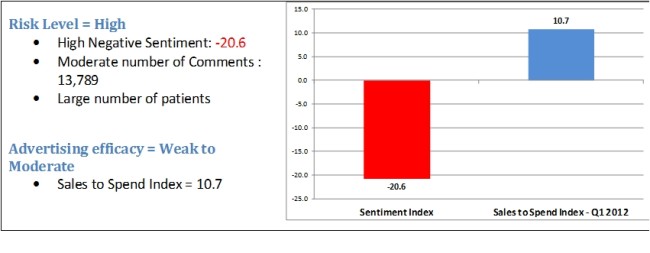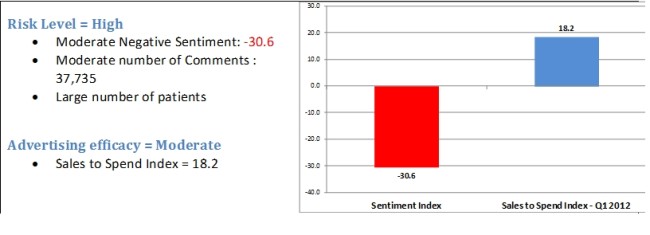Our series on the online reputations of the top 10 DTC-spending brands in Q1 2012 concludes with the seasonal and perennial allergies drug Nasonex and the pain management medication Lyrica—a treatment for fibromyalgia, diabetic nerve pain, spinal cord injury nerve pain and pain after shingles. As always, if you need a refresher course on the study’s methodology or terminology click here, or feel free to take another look at Cymbalta, Lipitor, Cialis and Abilify, Celebrex and Humira or Chantix and Novolog FlexPen. Otherwise, continue on to get a closer look at how the two drugs in our series with the lowest amount of advertising dollars were perceived online.
Nasonex

Nasonex has a moderately low sentiment index at -20.6 with a lower spend but also a low sales-to-spend index. Patient complaints of side effects contribute to most of the negativity as well as the fact that patients associated these side effects—especially, anxiety, mood changes, difficulty breathing, chest pains, sinus and ear infections and weight gain—with the drug.
Main Issues Contributing to Negative Sentiment
- Side effects including anxiety, mood changes, ocular hypertension, sinus pressure, headaches, nasal perforation, nose bleeds, difficulty breathing, chest pains and tightness, swollen throat, hair loss, eye irritation and redness, blurred vision, sinus and ear infections, loss of smell and taste, cough, and weight gain.
- Patients associated the side effects above to Nasonex years before physicians would acknowledge their issues and concerns.
- Cost is an issue for some patients.
- Some patients were prescribed Nasonex while they had an active infection that became worse.
- For some patients, since Nasonex is made in China, their trust in the product is reduced.
Main Issues Contributing to Positive Sentiment
- Nasonex works well for many patients reducing or eliminating nasal allergy symptoms.
- Both adults and children have positive experiences.
Main Areas of Risk
- For many, there are too many side effects for what many feel is simply allergy medicine and these may overwhelm benefits leading to poor patient adherence.
Lyrica

Lyrica has the second weakest sentiment index at -30.6 and the lowest advertising spend but still maintains moderate sales and a moderate sale-to-spend index. Patients find that Lyrica works for some pain and not others, and many fear taking Lyrica at work due to potential interference with work activities. Physicians may not be open to the active pain management that patients seek and this unfortunately can have a negative impact on the brand. Pain management remains a stigmatized and poorly understood area for both physicians and patients.
Main Issues Contributing to Negative Sentiment
- Higher cost than other medications such as Neurontin.
- Increased anxiety, suicidal thoughts, excessive weight gain, edema, fatigue, drowsiness, trouble breathing, tremors, vomiting, trouble with balance, dizziness, headaches, and inability to focus.
Main Issues Contributing to Positive Sentiment
- Provides relief for patients for sciatic pain, fibromyalgia, nerve pain, and pain from shingles.
- Many patients have struggled for years to find a product that works. Many patients believe it to be a miracle drug for them.
- Most patients for whom Lyrica works feel it is worth the cost.
Main Areas of Risk
- Many patients cannot take Lyrica during the day or at work due to side effects that interfere with their jobs or driving to work which does reduce overall adherence and the perceived value of the product.
- Lyrica works for some types of pain but not others. Patients and even physicians are not always clear what types of pain the product might work for as pain management seems to be trial and error. Patients have high expectations of Lyrica and if the product falls short, patient frustration levels become quite high quickly, which is reflected in strong patient negativity.
- Active pain management is something patients seek. Physicians may not be as open to a more proactive approach. This disconnect increases patient expectations for the product as patients feel that they needed to fight hard to get access to it. If the product again falls short, patient frustration levels become quite high quickly, which is reflected in strong patient negativity.
That concludes our series examining the online reputation of drugs. If you have any questions, please don’t hesitate to contact us.




